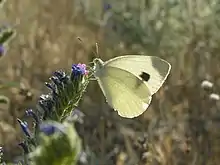Pieris mannii
Pieris mannii (southern small white) is a butterfly in the family Pieridae.
| Southern small white | |
|---|---|
 | |
| Scientific classification | |
| Domain: | Eukaryota |
| Kingdom: | Animalia |
| Phylum: | Arthropoda |
| Class: | Insecta |
| Order: | Lepidoptera |
| Family: | Pieridae |
| Genus: | Pieris |
| Species: | P. mannii |
| Binomial name | |
| Pieris mannii (Mayer, 1851) | |
The length of the forewings is 19–25 mm.
Description in Seitz
P. manni Mayer and rossii Stef [Pieris rapae var. rossii Stefanelli, 1900] are treated by us as forms of a separate species in accordance ith the observations of Count Emilio Turati communicated to us by letter. The larva is not yet known, but the shape of the pupa appears to afford sufficient proofof the specific distinctness of the insect. The pupa is not greenish as the rapae-pupa, but whitish with a reddish tint, being without dark dots and other markings. The spring-form manni differs from rapae gen. vern. metra in the underside being much lighter', and the black markings, especially above, being much more extended. — The summer-form rossii Stef. (20 d) is beneath not much lighter than manni, and also above the black markings are only slightly reduced, though being dusted with white. The species occurs in Italy, the Tyrol, South-Western Europe, according to Elwes also in Tura, according to the material before us in the Taurus, and probably also in other districts of Asia. [1]
The butterfly flies from March to October depending on the location.
Biology
The larva feeds on Cruciferae, especially Iberis sempervirens and Sinapis.
Identification
Compared to Pieris rapae, the cabbage-pest small white, the forewing spot is larger and squarish or even crescent-shaped rather than round. The apex marking extends further down the outer margin, reaching as far as the spot.[2]
Range
Until recently P. mannii has been confined to South Europe, Asia Minor, Morocco and Syria. It was first found north of the Alps in France and in Germany in 2008 and has since gradually extended its range in these two countries.[3] It was first sighted in the southern Netherlands in 2015.[4]
Etymology
Named for Josef Johann Mann
References
- Julius Rober in Seitz. A. ed. Band 1: Abt. 1, Die Großschmetterlinge des palaearktischen Faunengebietes, Die palaearktischen Tagfalter, 1909, 379 Seiten, mit 89 kolorierten Tafeln (3470 Figuren)
 This article incorporates text from this source, which is in the public domain.
This article incorporates text from this source, which is in the public domain. - "Pieris mannii". Faune-Alsace (in French). ODONAT. Retrieved 19 Jul 2017.
- "Pieris mannii / P. rapae". Lepiforum.de (in German). Retrieved 19 Jul 2017.
- "Scheefbloemwitje - Pieris mannii". Waarneming.nl (in Dutch). Retrieved 19 Jul 2017.